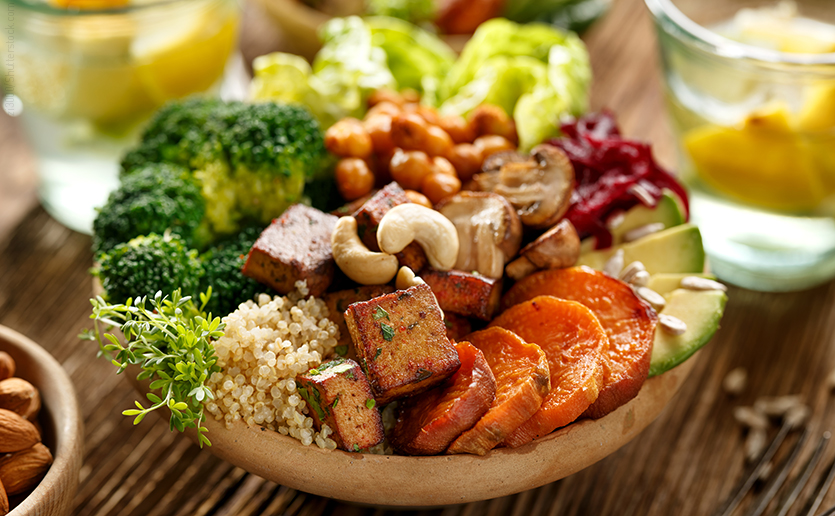Generations of mothers have been telling children to eat their vegetables. And research supports what parents have been promising all along: plants protect the body. That said, this message can feel tired. We have been hearing it for decades.
Research indicates eating the equivalent of roughly two cups of grapes a day may enhance the body’s defenses against the sun, making it more resistant to sunburn.
But an herbivore-friendly lifestyle includes some unlikely perks. (Even if you still dislike broccoli.) In fact, many types of produce offer protection when consumed often. While eating more plants won’t turn you into Superman, it just might make you a little more resilient to the type of kryptonite that can hinder you here on planet earth.
Protection From the Sun
Though food in the produce aisle won’t replace the need for sunscreen, certain plants may provide some protection against those harmful rays.
Research indicates eating the equivalent of roughly two cups of grapes a day may enhance the body’s defenses against the sun, making it more resistant to sunburn. It may also lessen the damage caused by ultraviolet light. These benefits are attributed to the fruit’s polyphenol content, which includes plant compounds like resveratrol.
The ruby-hued plant pigment, lycopene, may offer similar benefits. Eating a little less than a quarter cup of tomato paste daily has been associated with decreased damage from sun-related radiation, which can age skin by reducing elasticity and contributing to wrinkles. Lycopene is easier to absorb when it’s cooked in fat, meaning an olive oil-laced tomato sauce may be a worthy sidekick to meals. (Try this pasta.)
Similar amounts of lycopene can be found in a wedge of watermelon or about a third of a cup of tomato puree. The pigment is also found in guava and pink grapefruit. But — as is the case for most plant-based benefits — regular consumption is needed for any potential protection.
Enhancing Muscle Strength
Nitrates are commonly thought of as a preservative in processed meats and have been linked to increased cancer risk. But this is only part of their story. It’s the reaction of nitrates with other protein components when processing and cooking meat that may generate harmful compounds. For instance, fried bacon is frequently found to contain these potential carcinogens — sad news for BLT sandwich-lovers.
Low levels of magnesium can affect the release of neurotransmitters and play a role in blood vessel constriction, factors that may contribute to headaches.
But most of the nitrates we eat come from vegetables and we have plenty of research touting their benefits. These compounds may impact blood flow to muscles and have been linked to improved endurance and athletic performance. Recent research indicates diets high in nitrates may enhance strength too. Benefits can be seen with people who eat the equivalent of roughly a cup per day of leafy greens like raw spinach, lettuce, and arugula. (Beets and celery are sources too.) So, it might be worth paying a little more attention to the green stuff in our BLTs.
Help with Headaches
Processed diets have decreased the amount of magnesium in our food supply and it’s estimated almost half of Americans do not eat enough of the nutrient. Low levels of magnesium can affect the release of neurotransmitters and play a role in blood vessel constriction, factors that may contribute to headaches. Getting more of the mineral may even help reduce migraines in some people.
Magnesium is a component of chlorophyll, the pigment responsible for giving leafy greens their color. Not surprisingly, vegetables like spinach and swiss chard are good sources. Nuts also contain magnesium, but pumpkin seeds are a particularly rich source too — with two tablespoons providing about 30% of the recommended daily intake for most healthy adults.
Eating foods rich in protective plant chemicals, called flavonoids, has been associated with a decreased risk of depression.
Decreased Depression Risk
While nutrition is only one of many factors that may impact mental health, research is increasingly focused on the role diet plays on brain function and mood. Eating foods rich in protective plant chemicals, called flavonoids, has been associated with a decreased risk of depression. Flavonoids might reduce inflammation and improve blood flow in the brain. They may also help strengthen brain cells and support communication between them.
Fruits containing these protective compounds include blueberries, apples, and citrus (like grapefruit, oranges, and even fresh lemon juice). Vegetables like celery, kale and — yes — broccoli are also sources. Enhancing the flavor of food with parsley, thyme, mint, hot peppers, onions and scallions increases your flavonoid intake too. (Try this salad.)
So, mom was right. But, luckily, the benefits of a plant-based diet extend well beyond any boiled vegetables of youth.

Emily Gelsomin, MLA, RD, LDN, is a senior clinical nutrition specialist at Massachusetts General Hospital. As a registered dietitian, she counsels on medical nutrition therapy on an outpatient basis and is co-director of Be Fit, the hospital’s employee wellness program.
Jointly sponsored by The Clubs at Charles River Park and MGH Nutrition and Food Services, the 10-week program focuses on helping participants “Be Fit and Eat Right.” Every ten weeks, employees from different departments within the hospital compete with each other as they make a commitment to Be Fit. Through the creation of a social environment at the workplace, participants are supported to make progress in personal lifestyle changes with the help of a unique support system that includes a dedicated nutritionist and personal trainer.
Be Fit strives to create a milieu of wellness that extends beyond the 10-week curriculum by offering features to those who are not part of the intensive program. This includes the creation of Choose Well, Eat Well, a rating system designed to help both employees and patients increase awareness of healthy choices at retail eateries within the hospital. They also publish a timely nutrition tip each month.


